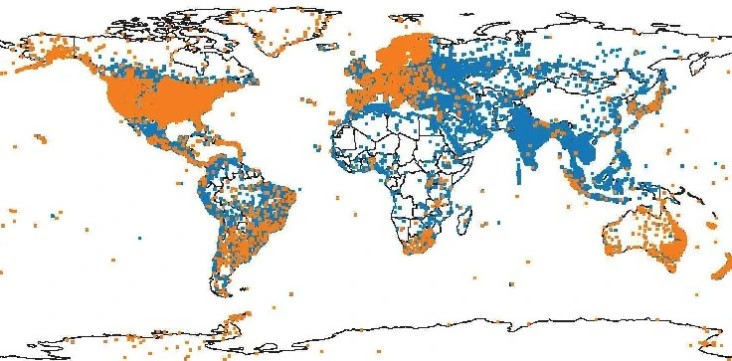


Crowd-sourced data could improve global navigation satellite systems such as GPS
Michael Allen on how essential it is to understand how clouds respond to climate
 Read article: Lightning sets off bursts of high-energy electrons in Earth’s inner radiation belt
Read article: Lightning sets off bursts of high-energy electrons in Earth’s inner radiation belt
Unexpected finding could help determine the safest times to launch spacecraft
 Read article: Bursts of embers play outsized role in wildfire spread, say physicists
Read article: Bursts of embers play outsized role in wildfire spread, say physicists
Experiments on tracking firebrands could improve predictions of spot-fire risks
 Read article: Eco-friendly graphene composite recovers gold from e-waste
Read article: Eco-friendly graphene composite recovers gold from e-waste
New graphene-biopolymer material extracts gold ions 10 times more efficiently than other adsorbents
 Read article: Physics-based model helps pedestrians and cyclists avoid city pollution
Read article: Physics-based model helps pedestrians and cyclists avoid city pollution
New immersive reality method could also inform policymakers and urban planners about risks, say researchers
 Read article: Mountaintop observations of gamma-ray glow could shed light on origins of lightning
Read article: Mountaintop observations of gamma-ray glow could shed light on origins of lightning
Electric fields near Earth’s surface are stronger than expected
 Read article: Ambipolar electric field helps shape Earth’s ionosphere
Read article: Ambipolar electric field helps shape Earth’s ionosphere
Scientists make first ever measurements of a planet-wide field that could be as fundamental as gravity and magnetic fields

Now open for original research submissions across all aspects of the global energy transition. Find out more today.

James Dacey reviews Becoming Earth: How Our Planet Came to Life by Ferris Jabr
Robert P Crease explains how Fermilab navigated an accidental leak of tritium
 Read article: Venkat Srinivasan: ‘Batteries are largely bipartisan’
Read article: Venkat Srinivasan: ‘Batteries are largely bipartisan’
Energy storage expert Venkat Srinivasan discusses the pros and cons of different battery technologies and the motivations people have for adopting them
 Read article: UK plans £22bn splurge on carbon capture and storage
Read article: UK plans £22bn splurge on carbon capture and storage
Despite the move, questions remain over the technology's feasibility
 Read article: Operando NMR methods for redox flow batteries and ammonia synthesis
Read article: Operando NMR methods for redox flow batteries and ammonia synthesis
Available to watch now, The Electrochemical Society in partnership with BioLogic, explore the application of magnetic resonance methods for studying redox flow batteries and ammonia synthesis
 Read article: Pele’s hair-raising physics: glassy gifts from a volcano goddess
Read article: Pele’s hair-raising physics: glassy gifts from a volcano goddess
Volcanic hairs and tears reveal a wealth of information about what lies within lava
 Read article: Convection enhances heat transport in sea ice
Read article: Convection enhances heat transport in sea ice
New mathematical framework could allow for more accurate climate models
 Read article: Rheo-electric measurements to predict battery performance from slurry processing
Read article: Rheo-electric measurements to predict battery performance from slurry processing
The Electrochemical Society in partnership with TA Instruments – Waters, identifies metrics linking formulation and processing of slurries to their performance as LIB electrodes
 Read article: A comprehensive method for assembly and design optimization of single-layer pouch cells
Read article: A comprehensive method for assembly and design optimization of single-layer pouch cells
The Electrochemical Society in partnership with BioLogic, EL-Cell and TA Instruments - Waters explains how to optimally test your lithium-ion battery electrode materials
 Read article: To make Mars warmer, just add nanorods
Read article: To make Mars warmer, just add nanorods
Releasing engineered nanoparticles into the Martian atmosphere could warm the planet by over 30 K
 Read article: Twisted fibres capture more water from fog
Read article: Twisted fibres capture more water from fog
New finding could allow more fresh water to be harvested from the air
 Read article: Metamaterial gives induction heating a boost for industrial processing
Read article: Metamaterial gives induction heating a boost for industrial processing
Technology could help heavy industry transition from fossil fuels
 Read article: Solar-driven atmospheric water extractor provides continuous freshwater output
Read article: Solar-driven atmospheric water extractor provides continuous freshwater output
Standalone device harvests water out of air without requiring maintenance, solely using sunlight
 Read article: Why NASA thinks you should forget about space-based solar power
Read article: Why NASA thinks you should forget about space-based solar power
James McKenzie thinks a new NASA report marks the end of the road for space-based solar power
 Read article: Shifting day-night cloud patterns may be making climate change worse
Read article: Shifting day-night cloud patterns may be making climate change worse
Asymmetric effects of surface warming on cloud cover may amplify it, say researchers
 Read article: Ask me anything: Andrew Weld: ‘You’re probably going to be working for over 40 years, so make sure you enjoy what you do’
Read article: Ask me anything: Andrew Weld: ‘You’re probably going to be working for over 40 years, so make sure you enjoy what you do’
Andrew Weld is the head of research and development at QLM technologies
 Read article: Fluorescent dye helps reveal the secrets of ocean circulation
Read article: Fluorescent dye helps reveal the secrets of ocean circulation
For the first time, researchers have directly measured the upwelling of cold, deep water towards the ocean surface
 Read article: Why North America has a ‘tornado alley’ and South America doesn’t
Read article: Why North America has a ‘tornado alley’ and South America doesn’t
There’s a scientific reason why Twisters is set in the US Great Plains rather than Argentina, and it has to do with the Gulf of Mexico
 Read article: Green challenge: can the shipping industry clean up its act?
Read article: Green challenge: can the shipping industry clean up its act?
James McKenzie reports on the launch of new ships that will help the world to cut greenhouse-gas emissions
 Read article: Satellites burning up in the atmosphere may deplete Earth’s ozone layer
Read article: Satellites burning up in the atmosphere may deplete Earth’s ozone layer
Pollution from decommissioned satellites re-entering the atmosphere poses a risk to the Earth’s protective ozone layer